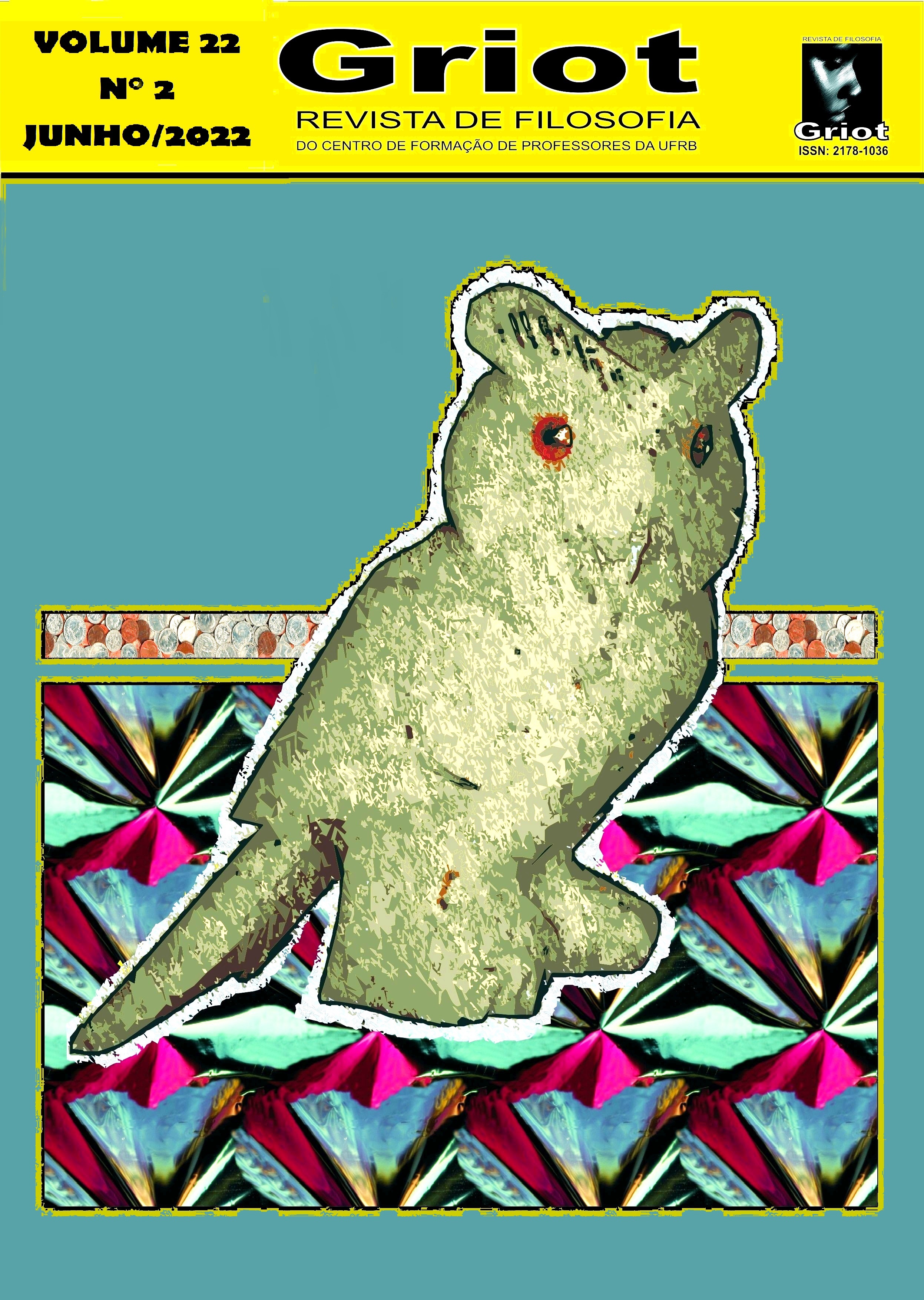Ludwig Feuerbach: why his ateism it would be ponderable?
DOI:
https://doi.org/10.31977/grirfi.v22i2.2918Keywords:
God; Essence; Religion; Christianity; Anthropology; Freedom.Abstract
The article searches to retract the theme of the inversion of theology in (on the )anthropology in(of) Ludwig Feuerbach, achieving the context of the philosophical tradition to create another vision in what sense it is correct to comprehend what the 19th century philosopher is not an atheist and also does not reduce to serving as a little point between two great authors: Hegel and Marx. Focusing(Proposing) on the an important question on the history of the philosophy, in those who looked deeply to the man, that claims a lot to find spur (encouragement),sense or peace, if in font of emptiness, of pain, produced by uncertainty, scarcity, anguish, impotency and suffering, can be realized all of this density that brought on the Feuerbach's philosophical work, which will be so much understood by inserting it in the context of discussions , tied on the field of our presenting world, because the problem that it is concerned there is the central themes of the philosophy leading to meditations on God, religion , theology, and everything that will be related to it in theoretical and practical life. Reviewing the structure and functioning of religion and the religious events as such, to the beyond that can be judge an atheist by the way.
Downloads
References
ARVON, Henri. Ludwig Feuerbach ou la transformation du sacré. Paris: Presses Universitaires de France, 1957.
ARVON, Henri. Feuerbach; sa vie, son oeuvre, avec un exposé de sa philosophie. Paris: Presses Universitaires de France, 1964.
CABADA CASTRO, Manuel. El humanismo premarxista de Ludwig Feuerbach. Madrid; La Editorial Catolica, 1975.
CASTILLA Y CORTÁZAR, Blanca. La antropologia de Feuerbach y sus claves. Madrid: Ediciones Internacionales Universitarias, 1999.
ENGELS, Friedrich. Ludwig Feuerbach e o fim da filosofia clássica alemã. São Paulo: Edições ISKRA, 2016.
FEUUERBACH, Ludwig. Manifestes philosophiques – Textes choisis (1839-1845). Traduit de l’Allemand par Louis Althusser. Paris: Presses Universitaires de France, 1960.
FEUERBACH, Ludwig. Preleções sobre a essência da religião. Trad. de José da Silva Brandão. Campinas, SP: Papirus, 1989.
FEUERBACH, Ludwig. Escritos en torno a La esencia del cristianismo. Estúdio preliminar, trad. y notas de Luiz Miguel Arroyo Arrayás. Madrid: Editorial Tecnos, 1993.
FEUERBACH, Ludwig. La esencia de la religión. Trad. de Tomás Cuadrado Pescador. Madrid: Página de Espumas, 2008.
FEUERBACH, Ludwig. Pour une reforme de la philosophie. Trad. de Yannis Constantinidès. Clamecy: Mille et Une Nuits, 2009.
FEUERBACH, Ludwig. L’essence du christianisme. Trad. de Jean-Pierre Osier. Paris: Gallimard, 2011.
FOLSCHEID, Dominique. Les grandes philosophies. 6 ed. Paris: Presses Universitaires de France, 1988.
HARVEY, Van A. Feuerbach and the Interpretation of Religion. Cambridge: University Press, 1995.
HEINE, Heinrich. Contribuição à história da religião e filosofia na Alemanha. Trad. e notas Márcio Suzuki. São Paulo: Iluminuras, 1991.
LOVY, René-Jacques. Luther. Paris: Presses Universitaires de France, 1964 (Mythes et Religions – Collection Dirigée par Georges Dumézil).
LÖWITH, Karl. De Hegel à Nietzsche. Trad. de Rémi Laureillard. Paris: Éditions Gallimard, 1969.
MARX, Karl. Crítica da filosofia do direito de Hegel. Trad. de Rubens Enderle e Leonardo de Deus. São Paulo: Boitempo, 2005.
MÉSZÁROS, István. A teoria da alienação em Marx. Trad. de Isa Tavares. São Paulo: Boitempo, 2006.
MONDOLFO, Rodolfo. Estudos sobre Marx; históricos-críticos. Trad. de Expedito Alves Dantas. SP: Editora Mestre Jou, 1960.
PHILIPPE Sabot (éd.) Héritages de Feuerbach. Lille: Presses Universitaires du Septentrion, 2008.
PHILONENKO, Alexis. La jeunesse de Feuerbach 1828-1841. Introduction a ses positions fondamentales. Paris: Vrin, 1990, Tomo I e II.
REDYSON, Deyve; CHAGAS, Eduardo Ferreira (org.). Ludwig Feuerbach; filosofia, religião e natureza. São Leopoldo, RS: Nova Harmonia, 2011.
REVISTA FILOSOFIA POLÍTICA, Dept. de Fil., IFCH/UFRGS/editor, Denis L. Rosenfield., Série III, n. 3 (“Hegel, a moralidade e a religião”), RJ: Jorge Zahar Editor, 2002 (número especial).
SCHMIDT, Alfred. Feuerbach o la sensualidad emancipada. Trad. de Julio Carabaña. Madrid: Taurus, 1975.
SERRÃO, Adriana Veríssimo. Pensar a sensibilidade; Baumgartem; Kant; Feuerbach. Lisboa: Centro de Filosofia da Universidade de Lisboa, 2003.
WEISCHEDEL, Wilhelm. A escada dos fundos da filosofia; a vida cotidiana e o pensamento de 34 grandes filósofos. 5 ed. Trad. de Edson Dognaldo Gil. São Paulo: Editora Angra, 2006.
TOMASONI, Francesco. Ludwig Feuerbach e a fratura no pensamento contemporâneo. SP: Loyola, 2015.
Downloads
Published
How to Cite
Issue
Section
License
Copyright (c) 2022 Arlei Espindola

This work is licensed under a Creative Commons Attribution 4.0 International License.
The authors who publish in Griot: Revista de Filosofia maintain the copyright and grant the magazine the right of first publication, with the work simultaneously licensed under the Creative Commons Attribution 4.0 International License, allowing sharing and adaptation, even for commercial purposes, with due recognition of authorship and initial publication in this journal. Read more...









































































